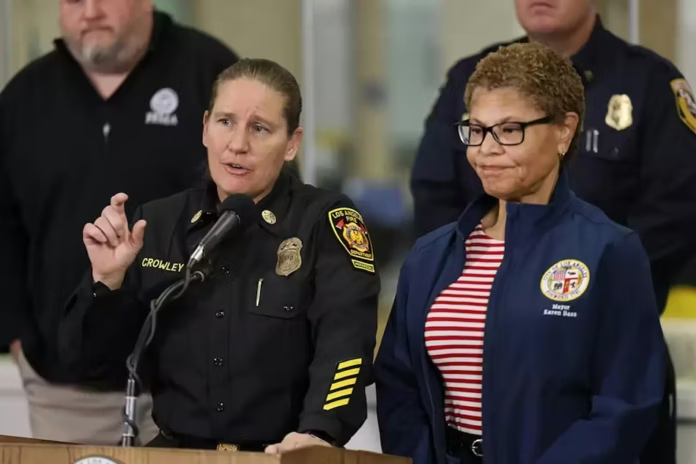Concerns Grow as Records Show L.A. Mayor’s Staff Knew of Fire Risks Before Departure
LOS ANGELES — New records reveal that Mayor Karen Bass’ aides were warned about extreme fire conditions before she left for an international trip, raising questions about her administration’s response to the devastating Palisades fire.
Early Warnings Ignored?
On January 3, just a day before Mayor Bass departed for Ghana, the city’s Emergency Management Department (EMD) issued an email alert to multiple city officials, including more than a dozen of Bass’ senior staff members. The message contained urgent weather forecasts predicting strong winds and critical fire risks, with a meeting scheduled to coordinate response efforts. The National Weather Service had also begun publicly warning of heightened wildfire dangers.
Despite these warnings, Bass proceeded with her planned visit to Ghana, where she attended the country’s presidential inauguration and a U.S. Embassy event on January 7—the same day the Palisades fire erupted. The fire ultimately claimed 12 lives and destroyed thousands of homes.
Mayor Bass Blames Fire Chief
Upon her return, Bass fired Los Angeles Fire Chief Kristin Crowley on February 21, citing failures in communication and fire preparedness. She has since claimed that had she been informed of the severity of the situation, she would not have even traveled as far as San Diego, let alone Ghana.
However, documents obtained through a public records request indicate that multiple members of her administration were informed of the potential for extreme fire conditions well before she left the country. Councilmember Monica Rodriguez, a vocal supporter of Crowley, pointed to the email alerts as evidence that the mayor’s office was in the loop.
“She keeps saying, ‘I wouldn’t have left had I known.’ But her staff did know,” Rodriguez said. “This verifies that her staff was notified of the potential threat by EMD, whose responsibility it is to let us know of these potential weather events.”
What Did the Mayor’s Team Know?
More than a dozen Bass aides received the January 3 email, which included a National Weather Service forecast showing a large red flame icon and the phrase “Critical fire conditions.” The forecast warned of wind gusts up to 80 mph starting January 7, combined with dry vegetation and low humidity—creating a high-risk fire environment for Los Angeles and Ventura counties.
Additionally, two of Bass’ aides—Christopher Anyakwo, her executive officer for emergency operations, and Jacquelyne Sandoval, her policy director for emergency management—received direct emails with Zoom links to a coordination meeting set for January 6.
Despite these alerts, Bass’ deputy mayor, Zach Seidl, downplayed the warnings, arguing that the emails did not indicate an imminent catastrophe. “That is not a warning of disaster. That sends the opposite message,” he stated.
Growing Criticism and Political Fallout
Following the fire, scrutiny has increased over how the mayor’s office handled the alerts. The National Weather Service had been holding daily briefings on the wildfire risk since late December, warning on January 2 of a “damaging offshore wind event” and raising the fire danger level to its highest category—extreme—on January 5, just a day after Bass left the country.
By January 6, the National Weather Service issued an even more urgent alert, stating, “HEADS UP!!! A LIFE-THREATENING, DESTRUCTIVE, Widespread Windstorm is expected Tue afternoon-Weds morning across much of Ventura/LA Co.”
Bass returned to Los Angeles on January 8, more than 24 hours after the fire had begun. She told reporters that she took the “fastest route back” and remained in communication with public safety officials while traveling. However, the controversy surrounding her absence, along with the dismissal of Chief Crowley, continues to fuel debate over leadership accountability and emergency preparedness in the city.
